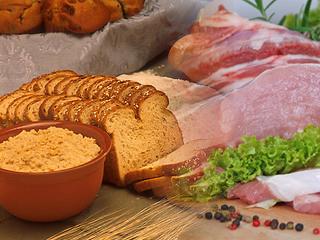Balancing protein and fibre in our diet
Published on 31 March 2011 in Food, health and wellbeing

Introduction
High protein diets can aid successful weight loss because they can help consumers feel `full’ i.e. they are satiating. However, diets high in protein and red meat might be problematic in terms of gut health, especially when carbohydrate intake is low. Decreased intake of dietary carbohydrates and especially dietary fibres might change the population of gut bacteria and their fermentation activity and decrease the production of beneficial fermentation products such as butyrate (Duncan et al. 2007).
High protein intake in the diet leads to more protein escaping digestion in the small intestine and additional protein will be transported to the large intestine. Here, bacteria from the colonic microbiota will use the proteins and amino acids as an energy source. When amino acids are fermented in such a way, several potentially harmful by-products are released into the gut lumen. Among these, ammonia and sulfide have been implicated in promoting intestinal tumours and inflammatory bowel diseases, respectively. Furthermore, phenolic compounds derived from the breakdown of aromatic amino acids and have been shown to be toxic to intestinal cells. Additionally, N-nitroso compounds, which are known intestinal carcinogens, are formed from precursor amines that derive from amino acid fermentation in the gut and are known to be increased in human faeces by consumption of diets high in red and processed meat.
Key Points
- The shift in fermentation activity of gut bacteria from using carbohydrate as substrate to increased protein fermentation has long been suggested to be problematic for gut health.
- Research studies using high levels of dietary protein in model systems suggest that protein, and particularly red meat, has the potential to yield breakdown products that will damage DNA in intestinal cells. This damage is believed to be an early event in cancer development.
- The 2007 World Cancer Research Fund report therefore recommends meat consumption to be limited to no more than 500 g red meat a week, with as little processed meat as possible to minimise the risk of colorectal cancer development. This recommendation has recently been adopted by the Scientific Advisory Committee on Nutrition (SACN) for the UK.
- New evidence suggests that the potential adverse effect of high protein and high meat diets on the health of the intestinal epithelium could be counteracted by incorporating increased dietary fibre into the diets. This needs to be proven in humans
Research Undertaken
Our research focuses on exploring the relationship between dietary protein, red meat, carbohydrate and dietary fibre on the formation of potentially harmful breakdown products in the human gut. We conduct carefully controlled dietary intervention studies in human volunteers, which enable us to precisely monitor the food consumed by each volunteer over several weeks. In faecal samples collected from these volunteers we then measure an array of bacterial fermentation products and are able to observe shifts in short chain fatty acid patterns with decreased carbohydrate intake, and increased levels of N-nitroso compounds with increased red meat intake.
When the carbohydrate intake in the diet is reduced and substituted with increased protein, the effect might even be accelerated. This observation leads us to believe that there is a potential for dietary carbohydrate that is non-digestible in the upper intestine but fermentable by the colonic microbiota to ameliorate these shifts in gut fermentation. By incorporating specific carbohydrates into diets which contain relatively high amounts of protein and red meat, we might be able to prevent or at least limit the production of harmful fermentation products that we previously observed in faeces of volunteers on high meat diets. Furthermore, we also use other dietary protein sources and assess their effect on gut fermentation products.
Policy Implications
Our research will help to develop diets that utilise the satiating effects of dietary protein while counteracting any potential negative effects on intestinal health. This has the potential to lead to recommendations for the general public on how to improve their dietary balance to achieve optimal health and wellbeing. It may also assist the food industry with the development of new products, or re-formulation of existing products, which can aid weight loss as part of a healthy balanced diet.
Author
Dr Silvia Gratz S.Gratz@abdn.ac.uk







